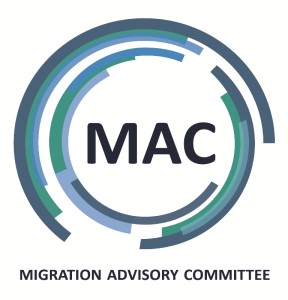Response to the Government Office for Science on updates to the Code of Practice for Scientific Advisory Committees (accessible version)
Published 23 April 2021
Migration Advisory Committee
1st Floor, Peel Building
2 Marsham Street
London
SW1P 4DF
12 April 2021
Government Office for Science
10 Victoria Street
London
SW1H 0ET
Dear Mairead,
Thank you for inviting the Migration Advisory Committee (MAC) to provide views on options for revising the Code of Practice for Scientific Advisory Committees (CoPSAC), which was last updated in 2011.
The MAC is an independent, non-statutory, non-time limited, non-departmental public body that advises the government on migration issues. That advice is provided from a social science perspective: historically this has primarily been Economics, though that is changing to bring in wider social science disciplines. The MAC is treated as a Scientific Advisory Committee within Home Office, all be it one with slightly different governance arrangements - as set out in its Framework Document - to the other SACs within the department, in that its reporting line is to the Director General for Migration, rather the other Home Office SACs who report to the Director General for Science, Technology, Analysis, Research and Strategy.
We have read the CoPSAC and the Chairs of Science Advisory Councils’ (CSACs) suggested revisions to this and agree with these suggestions. We believe the CoPSAC should be more explicit about the role of social science within SACs, as whilst its focus may have been on physical/natural sciences this is not the only type of scientific advice that government utilises in making policy.
We think it would be helpful to have more on data, and the expectations and how SACs work with their sponsoring department and Other Government Departments to access data necessary for their work in a timely manner. We recently responded to the Secretary of State for Digital, Culture, Media and Sport on the National Data Strategy making the point that “…we continue to face challenges in accessing data and it is a lengthy process. It is essential that we are able to access data in a timely way, in order to ensure that our recommendations and the immigration policy based on these are made using the best possible evidence. There is huge untapped potential in linking datasets across government, which would enable us to robustly measure the impact of the new immigration system during a period of huge change. We are continuing to work with the government on this and hope the National Data Strategy enables this type of research to happen in an efficient manner, whilst appreciating the importance of confidentiality and data security. We believe there should be a standardised process for us and other advisory bodies to access data for research, based on an agreed set of principles governing where and how access is granted.”
We would like to see greater consideration of the issues around research procurement. The CoPSAC currently states “SACs should have processes in place to enable the identification of relevant available research in the committee’s area. Where SACs feel that necessary information is lacking, they should ask that research be commissioned. Where a committee’s research is commissioned through its sponsoring department, departmental procurement rules and procedures should apply. When SACs commission new research on their own behalf, it is likely to be needed within a short space of time. Procedures for commissioning and quality assuring such work need to be quick and effective, but should take account of procurement procedures agreed with the sponsor department.” In practice we have found that there is frequently a degree of conflict between being able to commission new research in a timely fashion in order to meet deadlines and the lengthy timescales departmental procurement processes sometimes imply. We are grateful to the Home Office commercial teams for their ongoing support in navigating this process and we continue to explore options for making it faster whilst still ensuring value for money.
We also note the point in the CoPSAC that says “Where a SAC’s work is closely related to that of another advisory committee, the respective remits should be clarified in writing. There may be a system of cross-representation whereby each committee includes a member of the other to develop closer links and avoid inconsistencies of approach in related fields.” This is pertinent for how the MAC works with the Department for Education’s Skills and Productivity Board (SPB)[footnote 1] in the area of skills shortages, where the SPB’s remit may have some overlap with the work the MAC does on the Shortage Occupation List (SOL). We are already having ongoing dialogue with the SPB but believe there could be the potential for a sensible division of responsibility when looking at skills shortages. Further work is required in this area.
On behalf of the Migration Advisory Committee,
Yours Sincerely,
Professor Brian Bell Chair, Migration Advisory Committee
cc: Glyn Williams, Director General Migration Jennifer Rubin, Director General Science, Technology, Analysis, Research and Strategy Stephen van Rooyen, Chair, Skills and Productivity Board
-
The SPB does not have Scientific Advisory Committee status ↩

